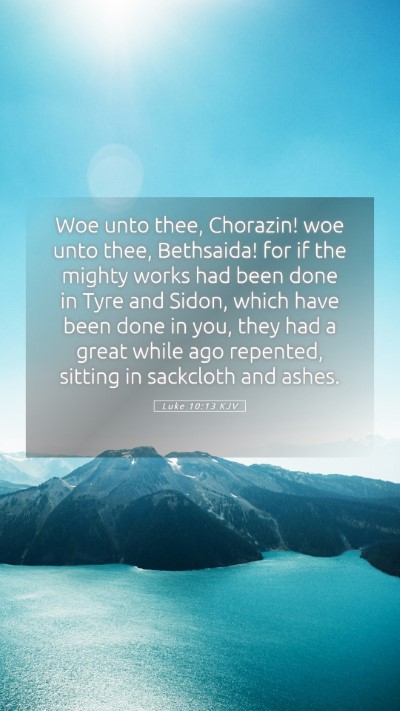Understanding Luke 10:13
Luke 10:13 states:
"Woe unto thee, Chorazin! woe unto thee, Bethsaida! for if the mighty works had been done in Tyre and Sidon, which have been done in you, they had a great while ago repented sitting in sackcloth and ashes."
Interpretation of the Verse
This verse emphasizes the serious implication of witnessing Jesus' miracles without genuine repentance. Jesus specifically addresses Chorazin and Bethsaida, two cities that witnessed his powerful ministry yet remained unrepentant. The comparison to Tyre and Sidon signifies how even notorious cities showed they would have repented if given the same opportunities.
Commentary Insights
- Matthew Henry's Commentary:
Henry highlights the accountability of those who receive the truth versus those who have not. The miracles performed in Chorazin and Bethsaida were a call to repentance, yet their rejection of Him brought them woe. He underscores that privilege entails responsibility, especially in the context of spiritual enlightenment.
- Albert Barnes' Notes:
Barnes discusses the significance of the cities mentioned and their apparent failure to respond to Jesus' teachings. He points to the importance of repentance as a necessary response to the grace shown by Christ through His miracles. The mention of sackcloth and ashes symbolizes deep remorse and humility, a state that the inhabitants of these cities remained in despite clear demonstrations of divine power.
- Adam Clarke's Commentary:
Clarke expounds on the contrast between Jewish cities known for their spiritual heritage and the pagan cities like Tyre and Sidon. He argues that their condemnation is intensified because they had the revelation of Christ and His works yet remained hardened in their hearts. Clarke notes how the verse cultivates a strong warning about the consequences of neglecting spiritual opportunities.
Meaning of Bible Verses in Context
This verse stands as a significant reminder about the nature of spiritual privilege and responsibility. The teachings from Luke 10:13 encourage believers to reflect on their responsiveness to God’s revelations in their own lives, and not to take for granted the acts of grace they may observe.
Application for Daily Life
In applying this verse, individuals are called to examine their own hearts regarding how they respond to God’s truth and presence. Are they merely spectators of faith, or do they embody the transformation that comes from repentance and genuine faith? This reflection can guide discussions in bible study groups and structured bible study lessons.
Historical Context of the Verse
The cities of Chorazin and Bethsaida were located in Galilee, which was the center of Jesus’ ministry. Their geographical and spiritual context adds depth to the understanding of the consequences binding these communities. The rejection of Christ represents a larger narrative about how Jesus was received by His people.
Cross References
- Matthew 11:21-22 - A parallel warning about the unrepentant cities
- John 15:22 - Rejection of Christ and the consequences of knowing Him yet not accepting Him
- Isaiah 23:1-18 - Prophecies concerning Tyre and Sidon
Conclusion: A Call to Seriousness
Ultimately, Luke 10:13 serves as both a warning and a call for introspection, compelling believers to consider the significance of responding to God's grace with true repentance. Understanding Scripture in this light fosters personal growth and enriches bible study resources, facilitating deeper bible study analysis.


